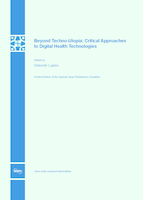Beyond Techno-Utopia: Critical Approaches to Digital Health Technologies
A special issue of Societies (ISSN 2075-4698).
Deadline for manuscript submissions: closed (30 March 2014) | Viewed by 149926
Special Issue Editor
Special Issue Information
Dear Colleagues,
Digital health technologies have received a high level of attention of late in the medical and public health literature and popular media. Much of this discussion takes an uncritical techno-utopian stance, representing these technologies as offering great potential for reducing healthcare costs and facilitating ‘patient engagement’ by encouraging lay people to take personal responsibility for their health and medical care and to participate in self-monitoring, self-care and self-tracking activities by ‘digitising’ themselves.
This Special Issue will be devoted to articles that take a more critical approach to analysing digital health technologies, drawing on social and cultural theoretical perspectives from such disciplines as sociology, anthropology, critical psychology, science and technology studies, cultural studies, cultural geography, social computing, media studies and communication. Papers are invited that address any type of digital health technology, including but not limited to telehealth, telemedicine, wearable computing, self-tracking practices (‘the quantified self’), health promotion using digital technologies, digital epidemiology and public health surveillance, digitised medical records, digitised personalised medicine and social media platforms for patients (such as PatientsLikeMe and Patient Opinion).
Professor Deborah Lupton
Guest Editor
Manuscript Submission Information
Manuscripts should be submitted online at www.mdpi.com by registering and logging in to this website. Once you are registered, click here to go to the submission form. Manuscripts can be submitted until the deadline. All papers will be peer-reviewed. Accepted papers will be published continuously in the journal (as soon as accepted) and will be listed together on the special issue website. Research articles, review articles as well as short communications are invited. For planned papers, a title and short abstract (about 100 words) can be sent to the Editorial Office for announcement on this website.
Submitted manuscripts should not have been published previously, nor be under consideration for publication elsewhere (except conference proceedings papers). All manuscripts are thoroughly refereed through a double-blind peer-review process. A guide for authors and other relevant information for submission of manuscripts is available on the Instructions for Authors page. Societies is an international peer-reviewed open access monthly journal published by MDPI.
Please visit the Instructions for Authors page before submitting a manuscript. Submitted papers should be well formatted and use good English. Authors may use MDPI's English editing service prior to publication or during author revisions.
Keywords
- digital health
- digital technologies
- the body
- health and illness
- self-tracking
- telemedicine
- telehealth
- digital epidemiology
- public health surveillance
- social media






